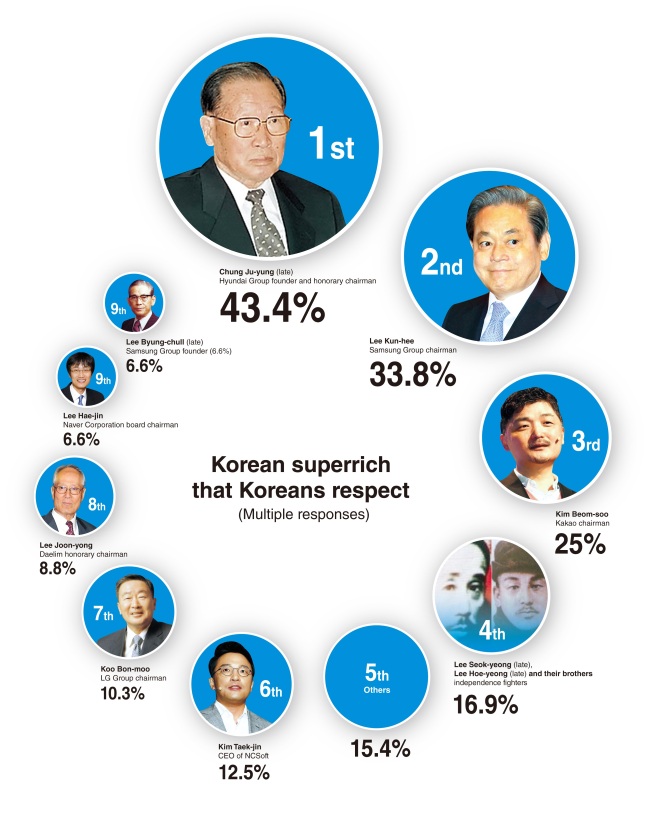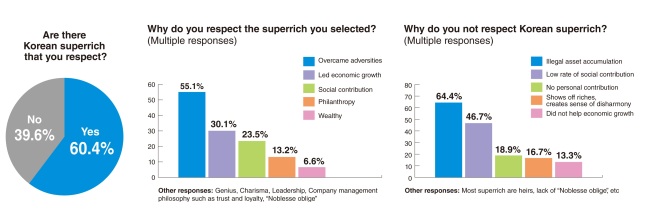The general public is more positive toward the superrich company founders rather than the chaebol heirs in Korea. There is also much less recognition for up-and-coming entrepreneurs in the Internet age and negative attitudes towards the corrupt billionaires have persisted, a recent survey by the Superrich Team found .
The survey on “Korean superrich the public respects” was conducted from Sept. 7-21 among 227 respondents.
The team would like to clarify that the word “respect” may not necessarily align with the dictionary definition of “having a sense of honor towards a person’s character, thoughts and behavior”, but rather as a means to assess the people’s opinion of the superrich in terms of how they obtained their riches and how they behave.
The results of the survey are a little different from conventional surveys regarding the superrich. About 60.4 percent of respondents replied that they have respect for a Korean superrich while 39.6 percent replied that they didn’t. In other words, six out of 10 perceived that there were Korean superrich worth respecting.
Those who responded positively mostly preferred those known for their social philanthropy, as well as first-generation corporation founders and newly-rising billionaires.
This was also shown in the roster of respected billionaires that people selected (multiple response, maximum of three). Out of the top 10 most selected superrich (average rating of 18.5 percent), six were company founders and philanthropists. The remaining four were chaebol heirs who received an average rating of 14.7 percent.
Respondents were generally favorable toward the superrich they selected. On a scale of 1 (not very favorable) to 5 (highly favorable), 35.8 percent of the respondents gave their chosen superrich 4 points. A total of 26.3 percent gave 5 points and 27.7 percent gave 3 points, showing that approximately 89.8 percent gave their preferred superrich a higher than average rating. In addition, 5.8 percent of the respondents gave 2 points and 4.4 percent gave 1 point.

The superrich who received the most favorable votes was late Chung Ju-yung, founder and honorary chairman of Hyundai Group, with 43.4 percent votes. He is regarded as one of the first generation entrepreneurs who set up Korea’s smokestack industries, starting with Hyundai Auto Service in 1946 and Hyundai Civil Works in 1947 (now merged to Hyundai Engineering and Construction).
Chung was also selected as the most respectable billionaire in last year’s survey by Gallup Korea (free response), receiving 13 percent of total votes.
Several “IT entrepreneurs” have also made the list of respected superrich. Kakao chairman Kim Beom-soo was ranked third with 25 percent of total votes, while NCSoft CEO Kim Taek-jin was ranked sixth with 12.5 percent. Naver founder Lee Hae-jin was ranked ninth with 6.6 percent of total votes.
Superrich who have worked toward a social cause have also been ranked high. The late Lee Seok-yeong, Lee Hoe-yeong, and his four brothers, who worked as independence fighters during the Japanese occupation, were ranked fourth as they had spent over 1 trillion won ($881 million) of their assets towards the independence movement.
The late New Il-han, founder of Yuhan Corporation and a major philanthropist in the early twentieth century, was also ranked as part of the “Others” list.
There were three superrich heirs who made the top ten list. Samsung Group chairman Lee Kun-hee was ranked second with 33.8 percent of total votes, LG Group chairman Koo Bon-moo was ranked 7th (10.3 percent) and Daelim honorary chairman Lee Jun-yong was in 8th place (8.8 percent).

There were three major reasons that people respected the Korean superrich. In a multiple response survey, 55.1 percent replied that they were inspired by how the superrich overcame adversities and succeeded. While 30.1 percent replied that the superrich led economic growth, 23.5 percent replied that the superrich showed significant social contribution.
However, there was also criticism of the Korean superrich. Although less people responded that they do not respect the Korean superrich compared to last year (66 percent responded “no” in 2014), the percentage was still close to 40 percent.
Their reasons for responding “no” were clear. In a multiple-choice survey, 64.4 percent selected “Illegal asset accumulation” as one of their reasons for not respecting Korean superrich.
Additionally, 46.7 percent responded that Korean superrich had a low rate of social contribution compared to the amount of their wealth.
Other responses that followed were “No personal contribution” (18.9%), “Shows off riches and creates sense of disharmony” (16.7%), and “Did not help with economic growth” (13.3%).
By The Korea Herald Superrich Team (sangyj@heraldcorp.com)
Hong Seung-wan, Cheon Ye-seon, Bae Ji-sook, Yoon Hyun-jong, Min Sang-seek, Kim Hyun-il, Sang Youn-joo
-
Articles by Korea Herald




![[Herald Interview] 'Amid aging population, Korea to invite more young professionals from overseas'](http://res.heraldm.com/phpwas/restmb_idxmake.php?idx=644&simg=/content/image/2024/04/24/20240424050844_0.jpg&u=20240424200058)












![[KH Explains] Korean shipbuilding stocks rally: Real growth or bubble?](http://res.heraldm.com/phpwas/restmb_idxmake.php?idx=652&simg=/content/image/2024/04/25/20240425050656_0.jpg&u=)

